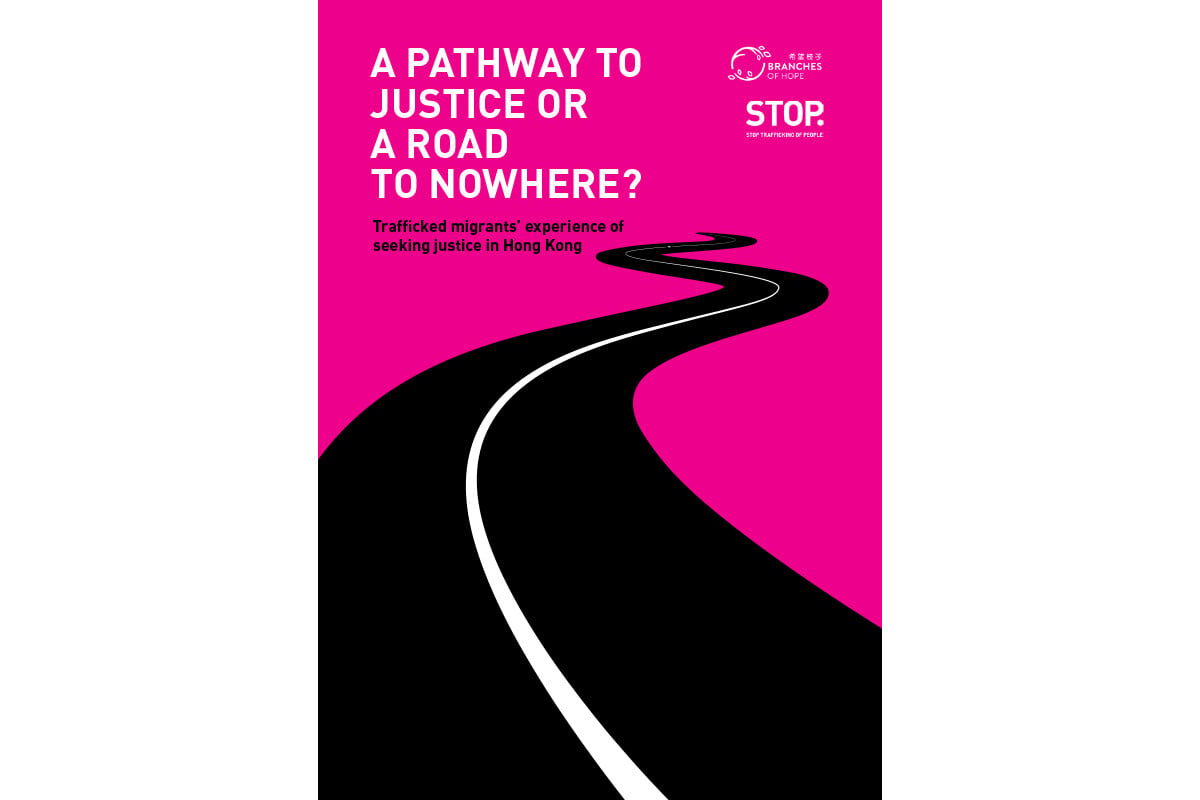Available Online in Multiple Languages (English/Bahasa):
English version:
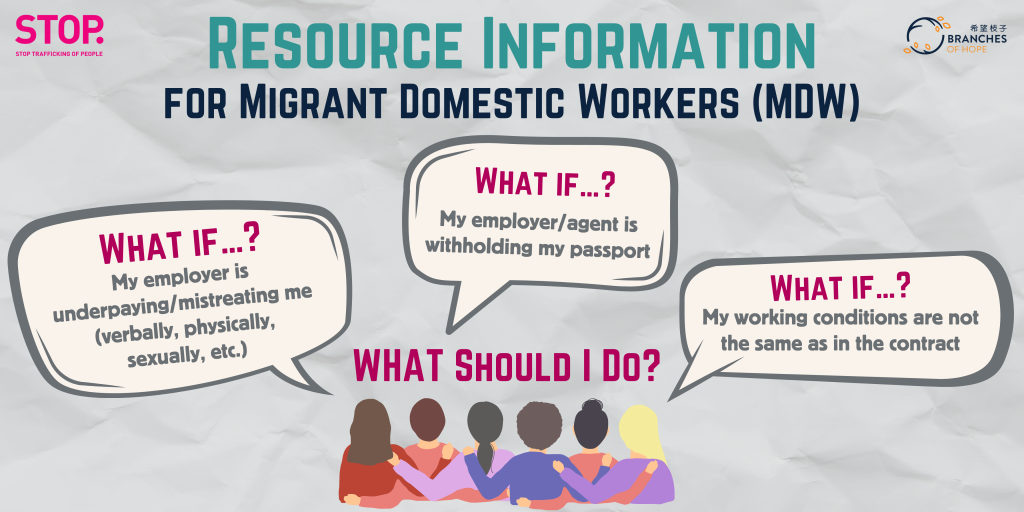

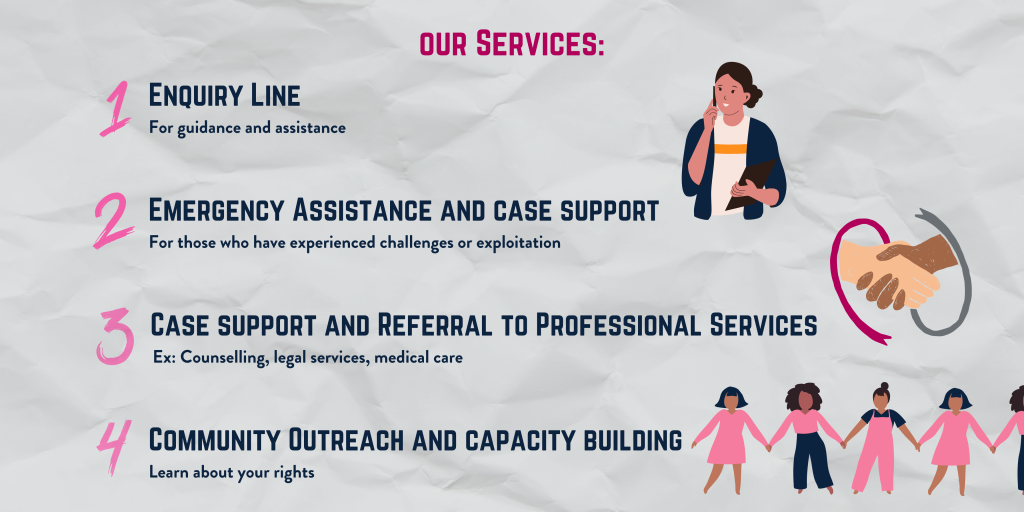
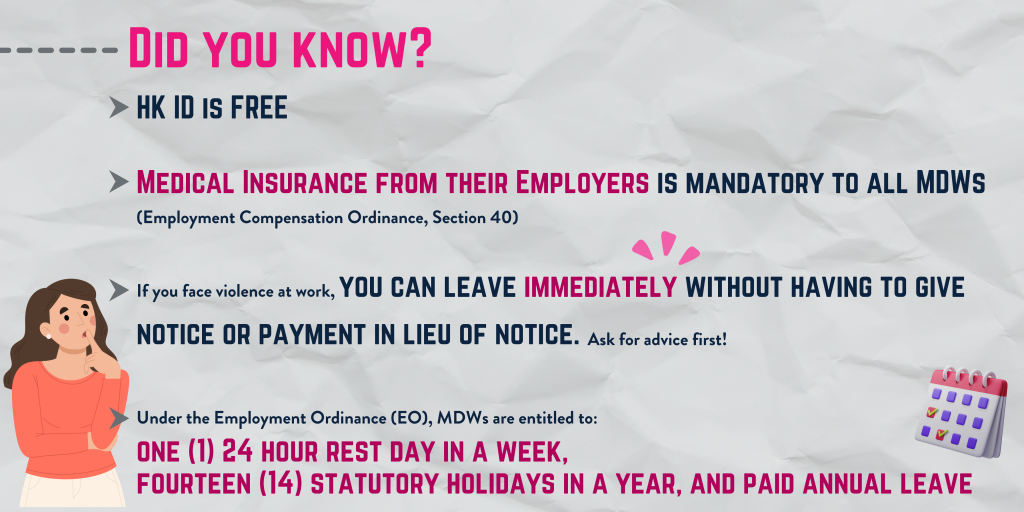
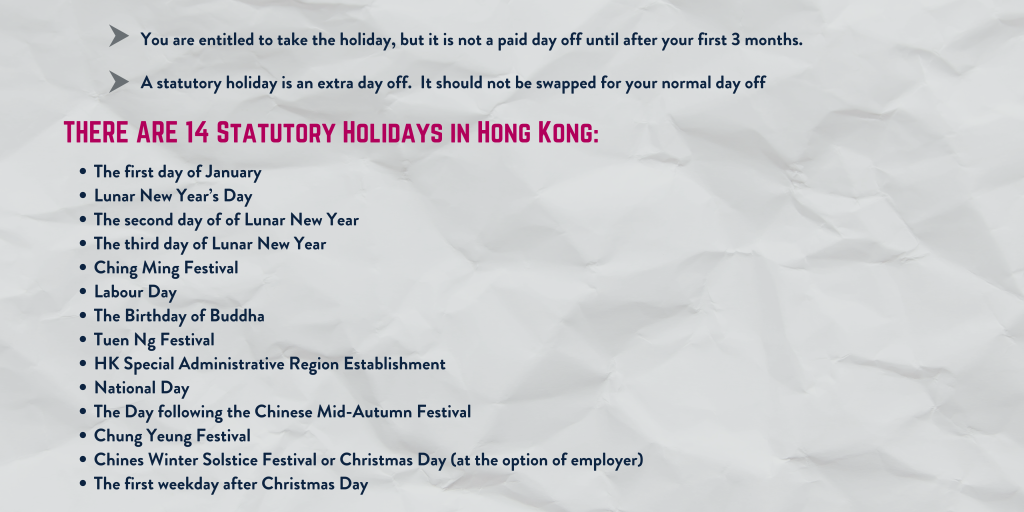
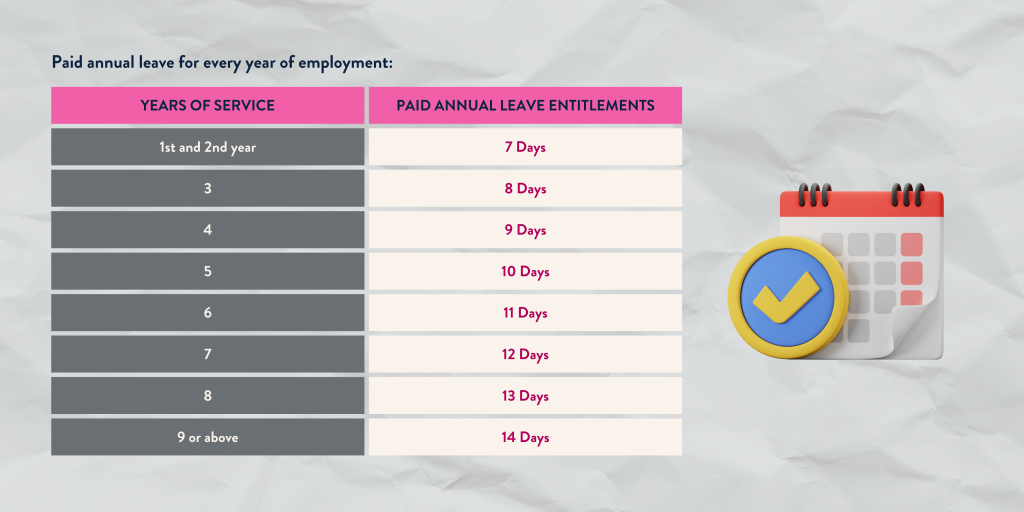
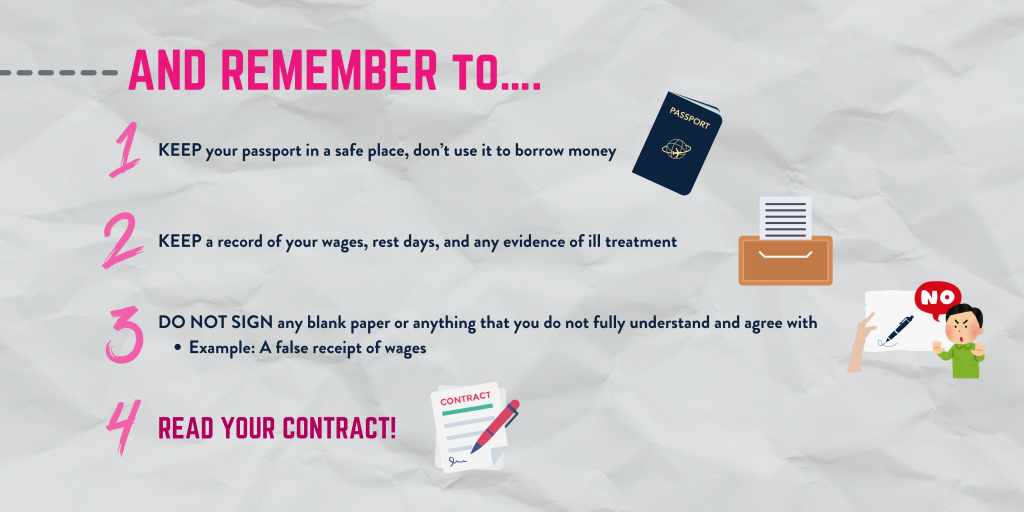
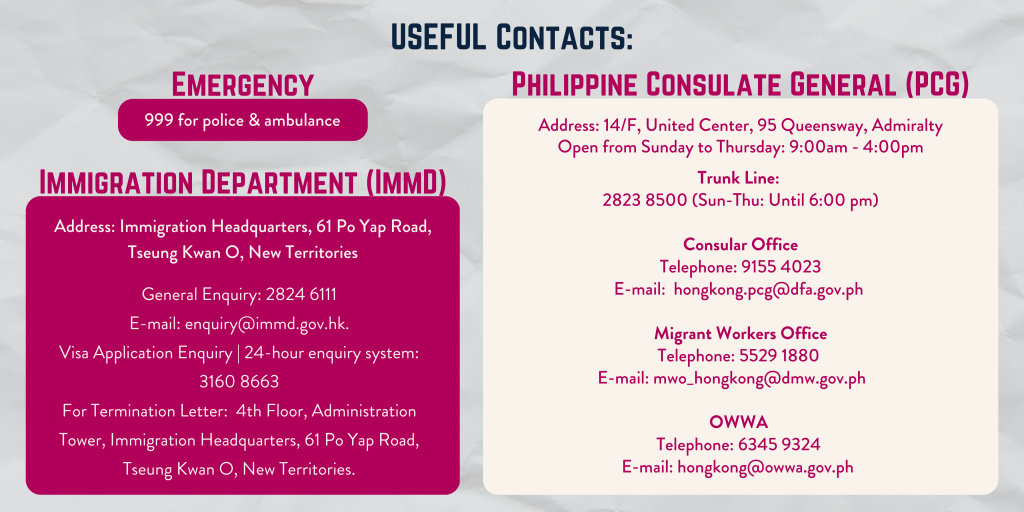
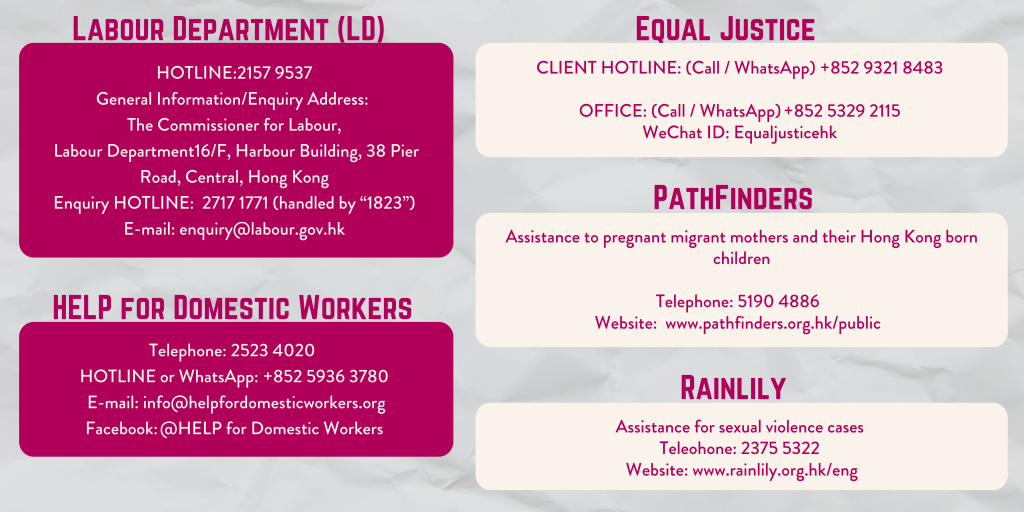
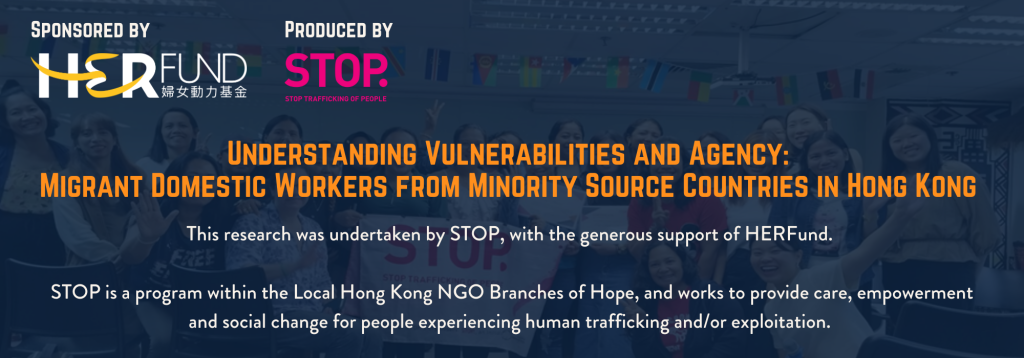
Resource Leaflet: “Your Hong Kong Journey: Rights & Wellness Guide for Migrants Domestic Workers”
A guide for migrant domestic workers to prepare for and adapt to working and living in Hong Kong. Available Online in Multiple Languages (English/Sinhala/Thai/Hindi/Nepali):
Sinhala – ඔබේ හොංකොං ගමන: සංක්රමණික ගෘහ සේවකයන් වෙනුවෙන් ඔවුන්ගේ අයිතිවාසිකම් සහ සුවතා මාර්ගෝපදේශ පත
Thai – การเดินทางสู่ฮ่องกงของคุณ: คู่มือสิทธิและสวัสดิการสำหรับแรงงานต่างชาติที่ทำงานบ้าน
Hindi – आपकी हांगकांग यात्रा: प्रवासी घरेलू कृषकों के लिए अधिकार कल्याण एवं बेरोजगारी
Nepali – तपाईको हङकङ यात्रा: प्रवासी घरेलु कामदारहरूको लागि अधिकार र कल्याण मार्गदर्शन
English version:

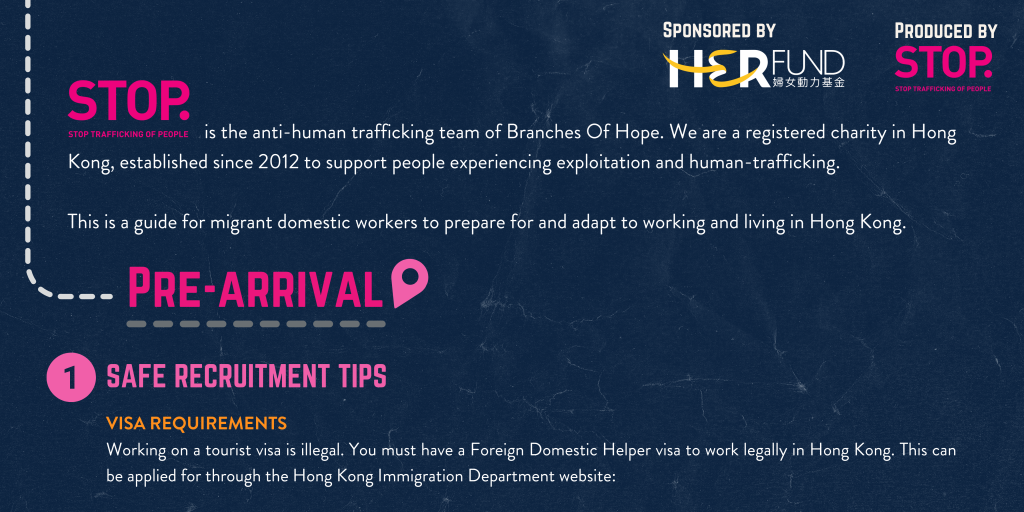

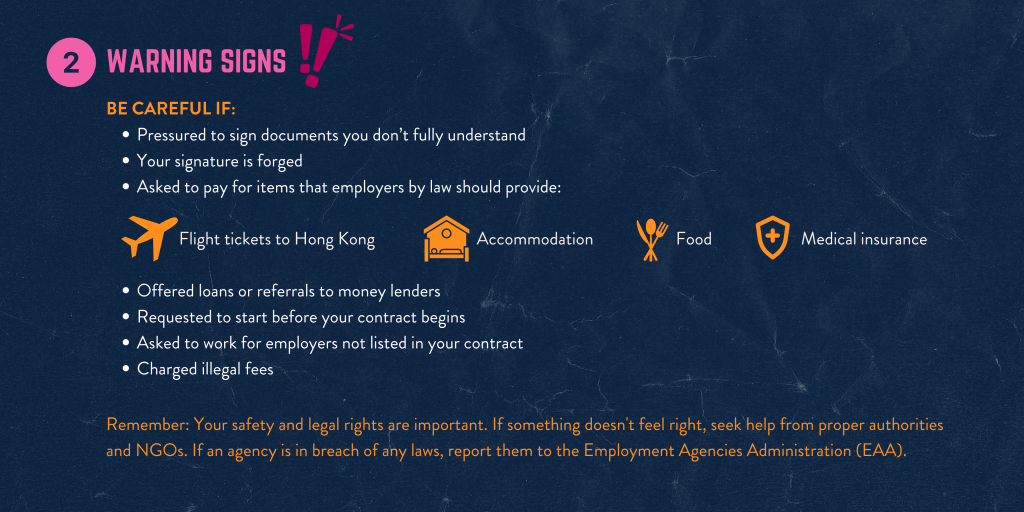
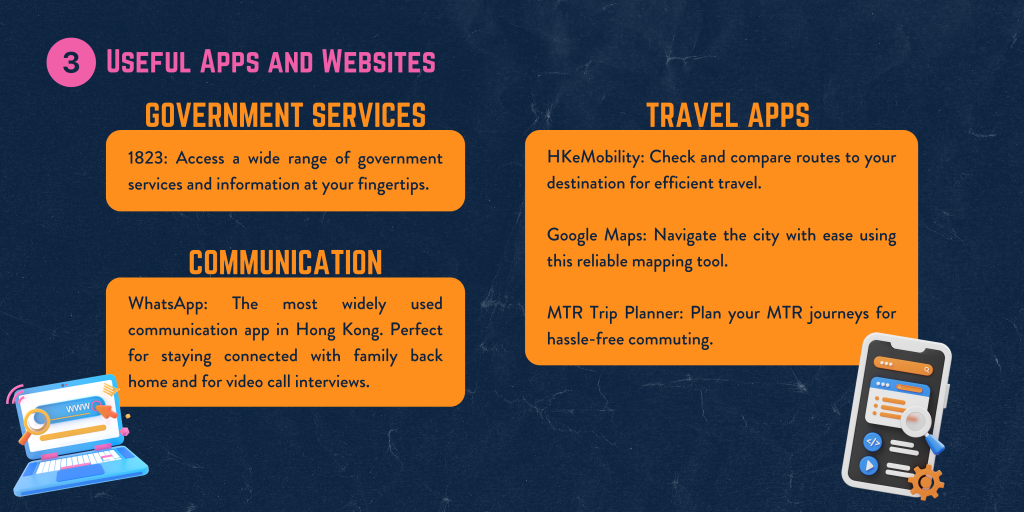
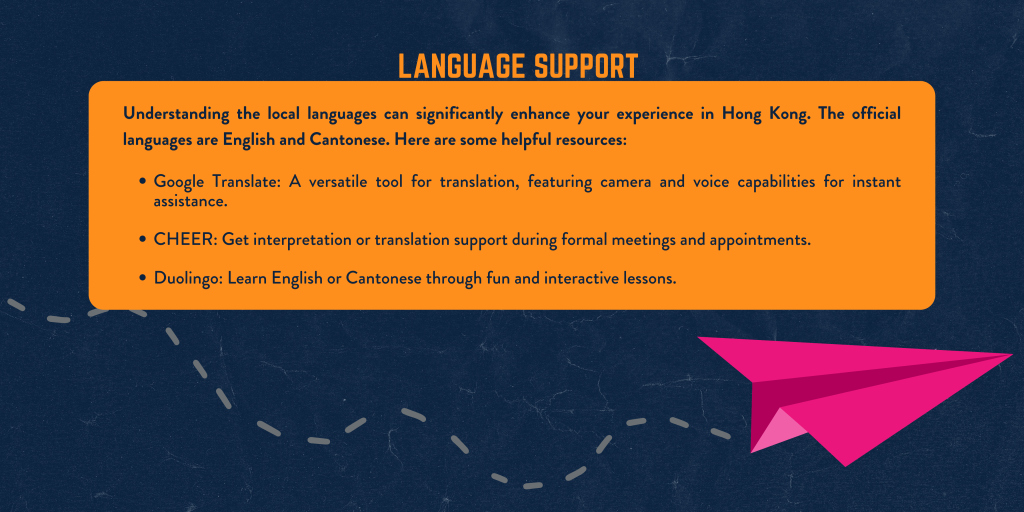
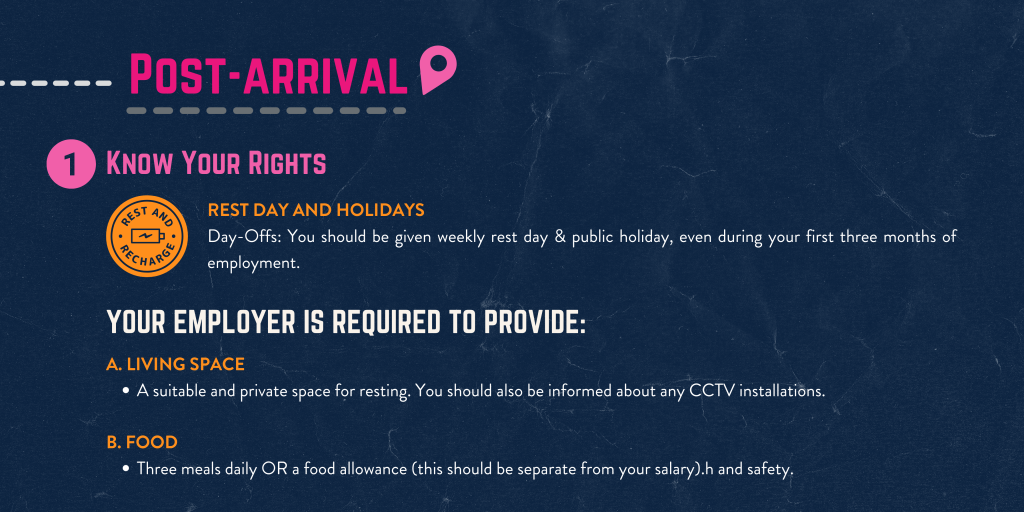

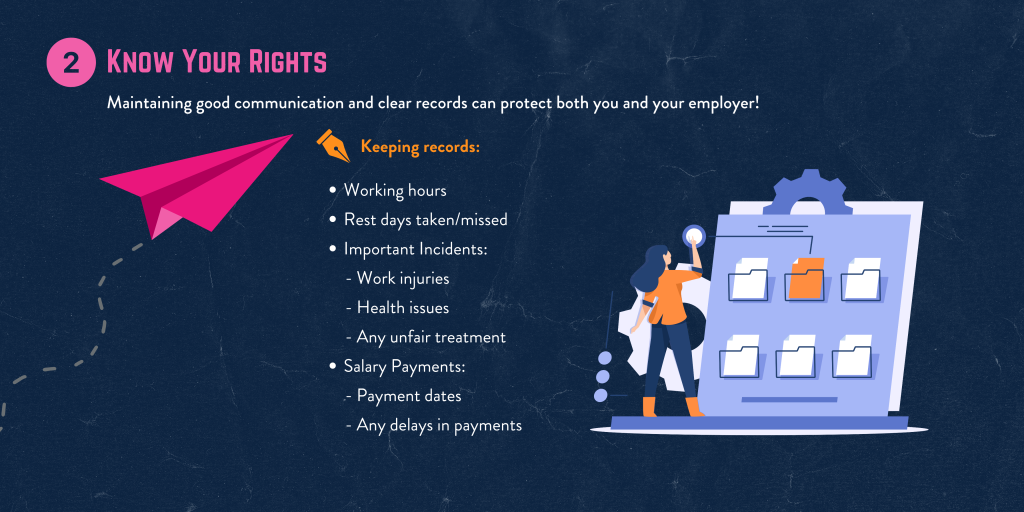
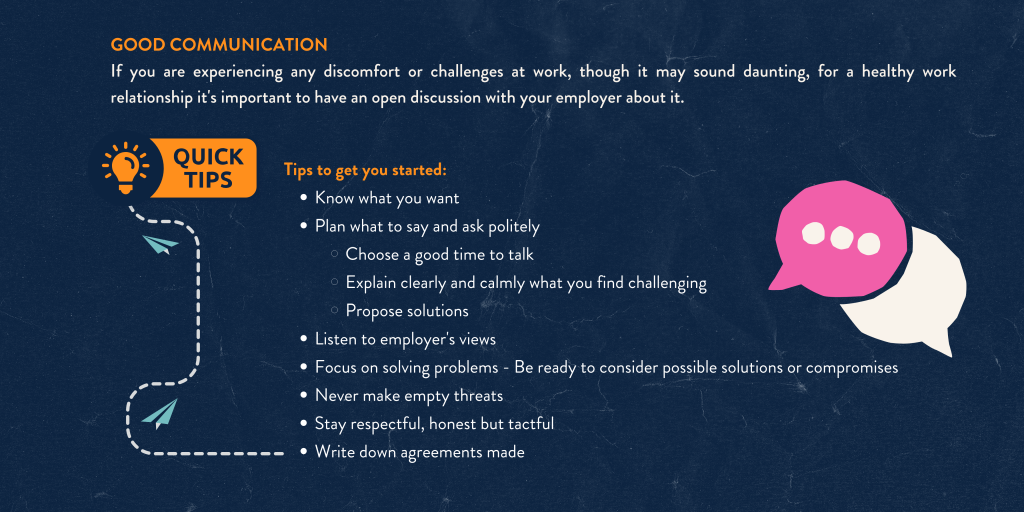
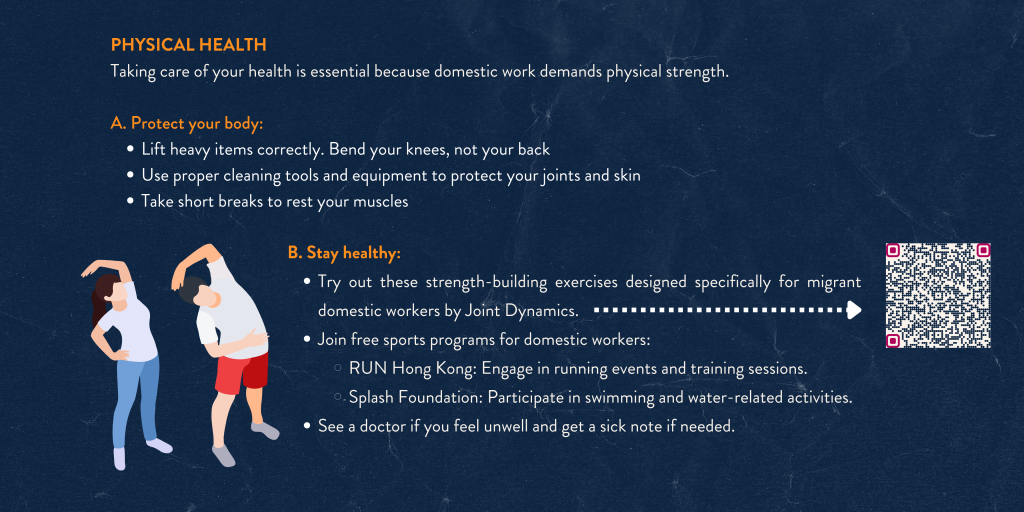
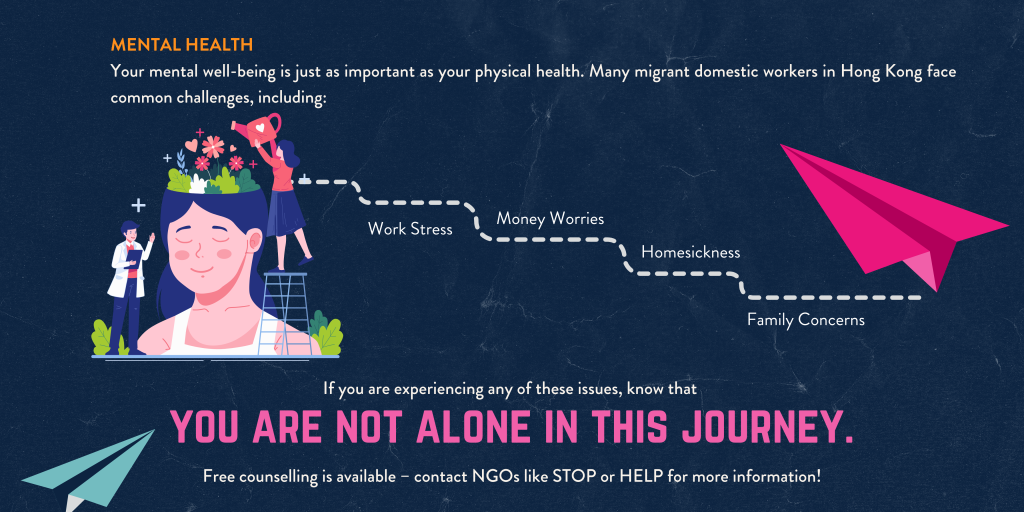
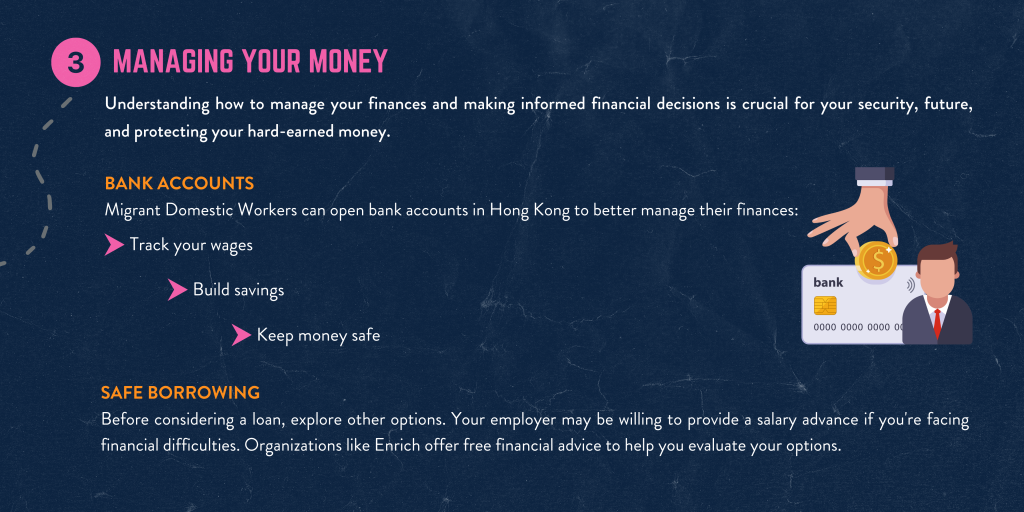

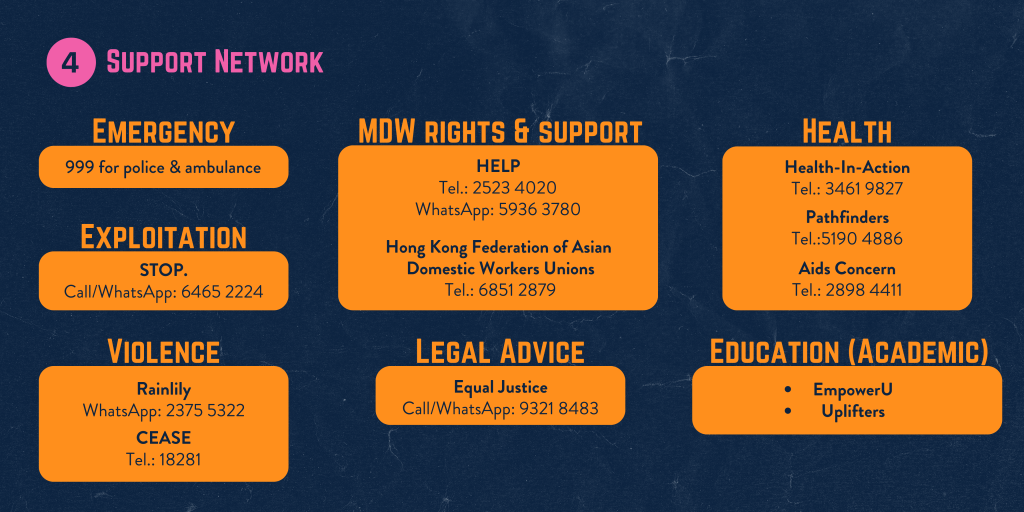
撰文: 陳詠欣 | 攝影: 劉玉梅
研究顧問: RIGHTS EXPOSURE | 合作機構: 青躍
「當時覺得有人陪自己出街,又有錢收,何樂而不為呢?」Crystal回想15歲時入行當PTGF時的心態,沒想到後來造成不可磨滅的傷痛;另一位女生Hedy為了還清前男友欠下的債務,無奈以身體賺錢。二人入行原因各異,但不約而同回想,若以前學校有全面的性權教育,自己或者會走上不一樣的路。
性侵創傷 死裡逃生
現年19歲的Crystal數年前被確診患上「邊緣人格障礙」,觸發病患的,是15歲那年一次當兼職女友(PTGF)的經歷。當時有位客人向她提出,願意付一年的費用包養Crystal,聲稱只需手淫,不會做她不願意的事。沒想到在酒店見面時,遭對方強迫性交,客人最終只付她500元,與原先說好的價錢相距甚遠。不過她當刻擔心人身安全,不敢追究便離開。
沒想到數天後,該位客人傳來Crystal正在整理衣衫的偷拍短片,威脅要再次見面,否則把短片傳給學校。「我好驚,不知可以去哪,跑到家附近的一條天橋,真的想跳下去一了百了!」幸好她心念一轉,向社工求助,在支援PTGF組織「青躍」的外展社工的陪同下報警。結果涉案男子被控以刑事恐嚇及強姦未成年少女罪成判囚,但Crystal確診患上「邊緣人格障礙」,一度因情緒波動而暴飲暴食,有創傷後壓力症候群症狀,需要退學休息。
憶述過往可怕經歷,Crystal總是語帶輕鬆,像在說別人的事。「我不想你們太過沉重,我好想投放些快樂給別人,不要為一件事太悲傷。」事件發生後,青躍的社工一直陪伴著她度過最難捱的日子,後來她遇上一位心儀的男生,幾經掙扎後決定向對方剖白過去的工作,對方並沒介意,堅決要跟她在一起。「他肯欣賞我,接納我,可能上天都想我重新站起來,歷史永遠抹不走,我可以用快樂去忘記過去。」幸得身邊人的支持,慢慢撐過去,事件沒有奪去她的夢想,她修讀了心儀的設計文憑,希望將來能為一些肥胖女生設計性感而可愛的內衣。
出租身體還債 望有脫離行業的一天
有別於Crystal已離開行業,25歲的Hedy(化名)仍在行內,不過她由全職PTGF,改為大半時間做其他兼職,不再靠「約人」為單一收入。「我都會老,到我年紀大些還可以繼續做嗎?好老實,我不是想靠男人過世的女生,因為我知道男人不可靠。」
Hedy說初時入行只為還清欠債,「我當時與男友同居,他用我的名字借錢,跟他分手後,我負債十多萬。」她以前試過高峰期一星期三單性交工作,其他時間就接一些陪吃飯、行街、看戲的工作,把時間表填得滿滿,亦曾被客人粗暴對待。「捏、打、搣,用盡所有方法打,好痛!他不是解決性慾,而是暴力發洩。」但她只能強忍。 Heidi說現時債務大部分已清還,亦自律地儲了錢,「靠自己最實際」。
身邊人支持重新出發 推動性權教育
Crystal離開了PTGF行業,但仍會間中在社交平台「上水」,留意其他PTGF的運作,她大感震驚:「現在有些女生12、13歲已出來做,我見過最年輕的只有11歲!有些人會post很大膽的裸照,面孔也見得清楚!」
雖然她同意性工作也是工作,但認為因為學校性教育不足,令這些未成年女生缺乏意識保護自己,把性工作看得太輕,甚至不知道危險在哪裡。「為什麼我當年是這樣,現在的女生又是這樣?」學校性教育停滯不前,她便透過青躍,以過來人身份到學校分享,並希望修讀性教育或法律,以自身經驗幫助其他倖存者。
Hedy也是因為接受青躍的服務,對性權漸漸多了認識:「學校立場不支持拍拖,更不會提性,中五時上生物課,老師才略略教過如何避孕。學生當然偷偷地拍拖,以前拍拖,以為愛對方就是答應他所有要求,即使自己不想也不懂拒絕,現在才知道自己可以說不,不用逆來順受。」Heidi回想若當初學校能提供正確性權教育,尤其是與伴侶相處之道,事情走向或會不一樣。





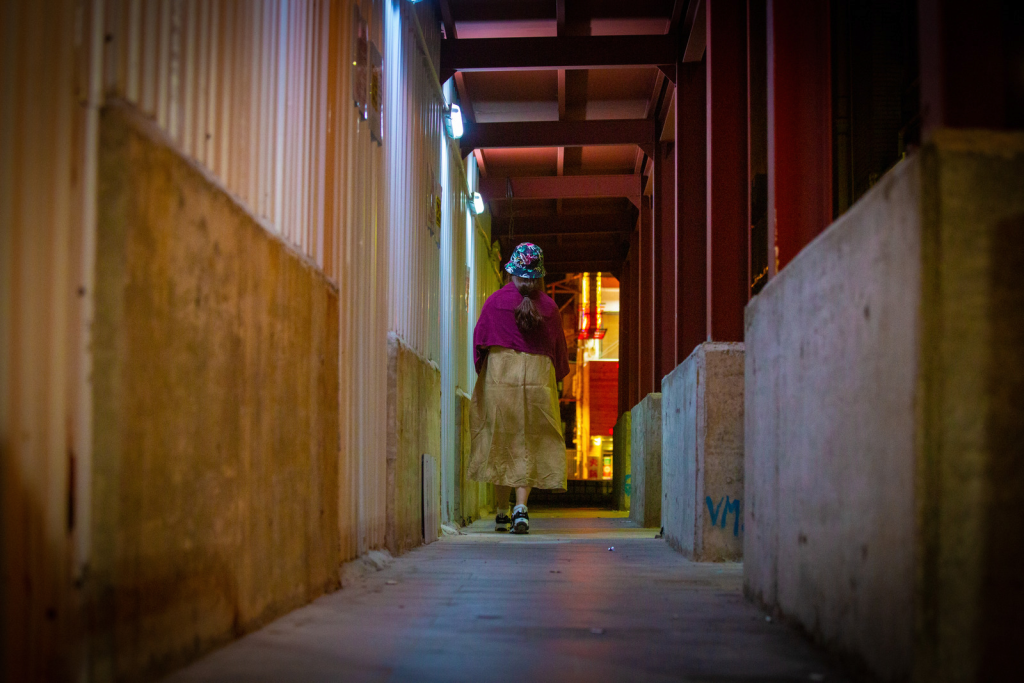
AUTHOR (CHINESE): EUGENE CHAN | PHOTOGRAPHY: CAROL LAU
PROJECT CONSULTANT: RIGHTS EXPOSURE | PARTNER ORGANISATION: TEEN’S KEY
Business models in the sex industry has continually evolved, yet clandestinity of the the trade has remained ever-constant. More than a decade ago, the phenomenon of part-time girlfriends (PTGF) emerged with the rise of social media. While women and girls traded their company for money, they also face multiple risks. Between 2019-2020, STOP (Stop Trafficking Of People), an initiative of the local non-profit organization, Branches Of Hope conducted interviews with PTGFs and relevant stakeholders, to gain an inside view on the industry. It was observed that social support for young sex workers was generally lacking. Not only that, workers frequently encountered immense setbacks in seeking police help. Henceforth, STOP has actively joined forces with partner organizations in recent years to push for local legislation on combating human trafficking, and tougher sanctions for sex exploiters.
Snakes in the grass of Hong Kong’s sex industry: Hostile response from officers
Human trafficking and exploitation in the sex industry may appear to be two separate issues, yet both commonly involve the use of control tactics, such as threat, extortion, and deception to manipulate others. “Not all young sex workers are exploited. However, as existing policies are inadequate to provide protection, engagement in the line of work exposes workers to exploitation risks.” explained Michelle Wong, Program Manager of STOP. Despite sex workers’ voluntary participation in the sex industry, they may still face varying degrees of threats and exploitation during the transaction process, which undermines their bodily autonomy. Wong also indicated that while PTGFs may undertake in intimate acts with clients, not all of them would provide sexual services. Accordingly, STOP’s research interviews targeted only PTGFs who engages in transactional sex.
Between 2019-2020, through referrals from Teen’s Key, a local charity that provides support to PTGFs, STOP and international human rights research consultancy firm, Rights Exposure, conducted in-depth interviews with seven young sex workers. Results showed that all interviewees had experienced different degrees of exploitation, including clients’ refusal or evasion of payment; stealthing, which disregards the worker’s sexual consent, and heightens their health risks of unintended pregnancies as well as sexually transmitted diseases; as well as voyeurism and sextortion. With regards to relatively less severe forms of exploitation, such as payment evasion, some interviewees reflected that they would rather stay silent and not seek help, due to the cumbersomeness of filing police reports and the unlikeliness of recovering the money successfully. Only in the occurrences of grave criminal offences, like rape, would workers consider reporting to the police.
Moreover, even if victims were willing to file a report, the stigmatizing attitude and hostility towards sex workers of some officers often discourage victims from pursuing justice. One of the interviewees who filed a report for nonconsensual dissemination of private sexual images, recalled feeling looked down upon throughout the process of statement-taking, due to the disdainful attitude and language of the male officer-in-charge. “He seemed to believe that because of my job as a sex worker, I deserved to be mistreated,” she added. In another case, the victim reportedly came forward to report criminal intimidation but received no response nor follow-up from the police, and was not even notified when her case was closed.
Veronica Siu, Assistant Program Officer of STOP, urges law enforcement agencies to improve training for frontline officers, and integrate into practice trauma-informed approaches when responding to potential cases of exploitation, so to avoid retraumatization.
Lack of community support
According to Teen’s Key’s 2019 annual report, of the 10,000+ young women and girls screened and assessed for sexual risks, approximately 1,500 cases were identified as high-risk and required follow-up care, which involved incidences of threats of violence, voyeurism and sextortion, cyberbullying, sexually transmitted diseases and unintended pregnancies. Despite the staggering number, availability of relevant social support services is greatly lacking. Across the 14 stakeholders interviewed by STOP, it was learnt that in Hong Kong, there are only two organizations that provide services specifically designed to meet the needs of young sex workers in Hong Kong, namely Teen’s Key and Yang Memorial Methodist Social Service.
Founded 10 years ago, Teen’s Key initially focused its efforts on promoting occupational safety and health to PTGFs. Over the years, they gradually expanded their service scope to also support the personal development of female youths in Hong Kong. As opposed to the norm of street outreach, Teen’s Key’s social workers approach youths through various major social media platforms, and regularly message PTGFs about the types of services that the organization offers, such as free rapid sexual health tests for gonorrhea, syphilis, and AIDS; as well as legal assistance if necessary. “Most times, they tend to just leave us on read, but in times of emergency, they know they can call our 24-hour emergency hotline. We don’t lecture people. Instead, we walk alongside survivors as they decide on their next steps,” said Denise Lam, Social Worker and Outreach Programme Officer of Teen’s Key.
Lag in Sex-Ed: Ignorance to condom use in STD prevention
These high-risk cases accentuate the severe inadequacy and outdatedness of sex education in Hong Kong. Findings from STOP’s interview data revealed that prior to connecting with Teen’s Key, some interviewees never knew that proper condom usage could reduce the risk of STDs.
There is more to sex education than contraceptive knowledge. “Oftentimes during outreach, the questions asked aren’t about how to wear a condom. The girls are interested to know ways to say ‘no’ in relationships, and how to communicate openly and honestly with their partner,” added Rachel Chow, Resource Development Manager of Teen’s Key. Hence, in addition to providing sexual health knowledge, Teen’s Key’s sexuality & consent educational classes also use role-playing activities to discuss common relationship queries.
Inadequate laws to protect sex workers
To more effectively protect young sex workers from exploitation, STOP advocates the enactment of a comprehensive human trafficking law in Hong Kong. Currently, the human trafficking law in Hong Kong solely addresses the crime of forced prostitution, while the government’s launch of the “Action Plan to Tackle Trafficking in Persons and Enhance Protection of Foreign Domestic Helpers in Hong Kong” in 2018, only targets to respond to the labor exploitation of foreign domestic workers. As Wong emphasized, the existing legal framework continues to define human trafficking too narrowly, leading to those who were neither forced into sex work nor an exploited foreign domestic worker, but nonetheless a victim of other forms of human trafficking, to be left out of the justice process.
Based on the present law, even if the perpetrator is successfully prosecuted, the penalty tends not to sufficiently reflect the gravity of their crime. “The criminal consequences for rape is relatively severe, yet for voyeurism and sextortion, they are far less stringent. As for the act of grooming, it might even be the case that it is not punishable – unless unlawful sexual intercourse with a child victim under the age of 13 has occurred – which has no deterrent effect.” Wong believes that criminalizing all forms of human trafficking would allow exploited sex workers to better understand their own situation and report for police help without help when in need. The law could also deliver a message to the public that perpetrators require more severe punishment.
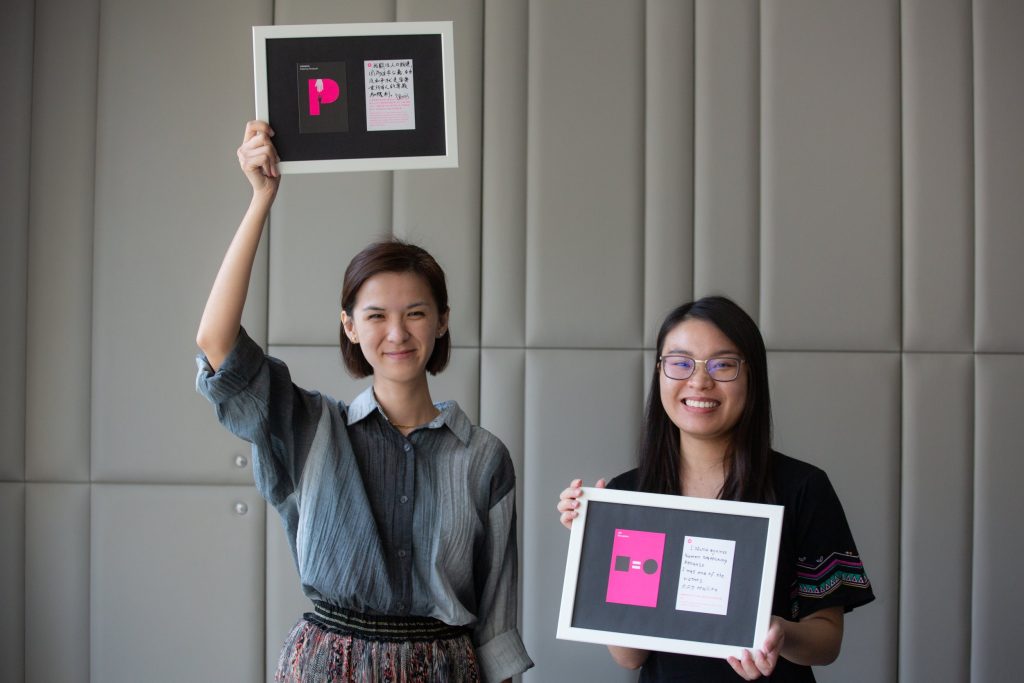


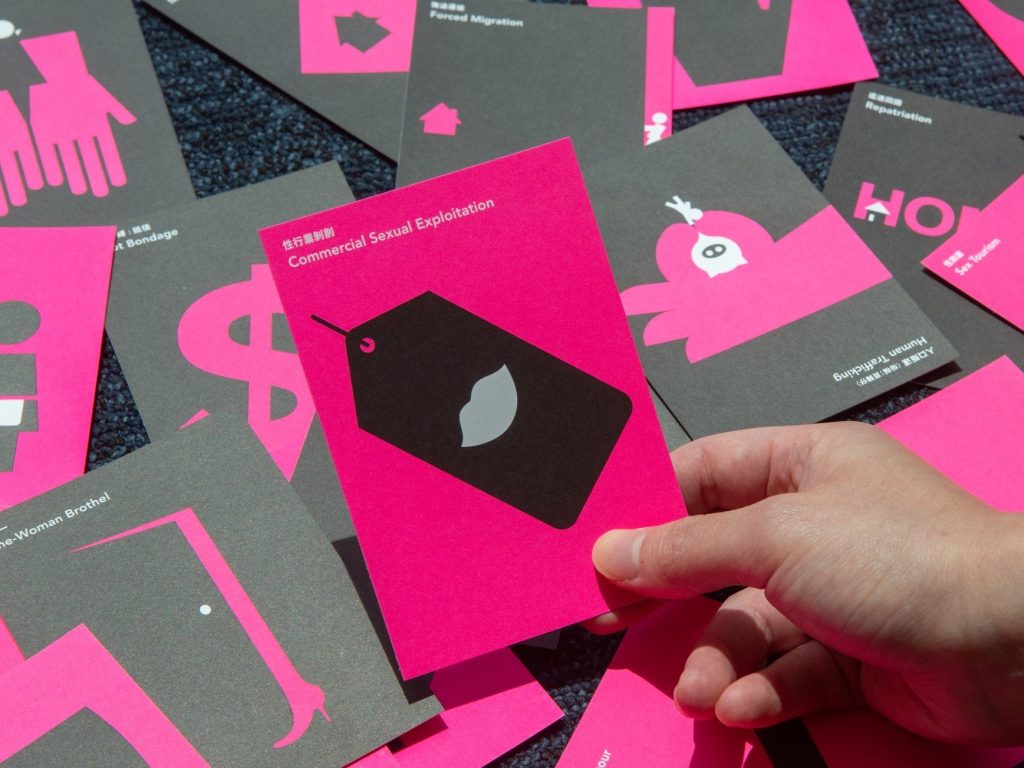
撰文: 陳詠欣 | 攝影: 劉玉梅
研究顧問: RIGHTS EXPOSURE | 合作機構: 青躍
性工作者的經營模式一直在改變,不變的是其隱藏性。十年多前隨社交媒體流行,兼職女友(PTGF)出現,女生以陪伴賺錢,同時面對各種威脅。本地慈善機構希望枝子的項目之一「停止人口販運」(Stop Trafficking of People; STOP)於2019-2020年期間,與共21位持分者進行訪問了解業內近況(包括PTGF及相關支援組織),發現年輕性工作者不但缺乏社會支援,報警求助亦困難重重。於是STOP近年積極聯繫友好組織,望推動政府立法,令性剝削施害者得到嚴懲。
性交易安全隱患 報警求助遭敵視
人口販運與性交易的剝削看似兩回事,但兩者都是利用威脅、勒索、欺騙等手段操控別人。「並非每個年輕性工作者都被剝削,但由於當前法律不足以保障她們,這工作會令她們曝露於被剝削的危機當中。」STOP項目經理黃筱媛(Michelle) 解釋,即使性工作者自願進行性交易,都可能在交易過程中受到不同程度的威脅和剝削,失去人身自主。她又指,PTGF會與客人發生親密行為,但不一定涉及性交易,而STOP的研究對象則是會提供性服務的年輕女生。
STOP於2019-2020期間,委託國際人權顧問公司Rights Exposure,透過支援PTGF的慈善組織 青躍介紹,訪問了7位年輕性工作者,發現受訪者都曾受到不同程度的剝削,例如被客人「食霸王餐」,或被客人強行除套性交,不但違反她們的意願,亦增加意外懷孕及感染性病風險;還有在交易過程中遭偷拍勒索。對於「食霸王餐」這類相對較輕的剝削案件,有受害人認為報案程序繁瑣,不太可能追討款項而選擇啞忍。只有發生強姦等嚴重的刑事案件,受害人才會報警。
即使願意報警,部分警員對性工作者的污名化及敵對態度,也令求助人卻步,有一位受訪者因私密照片和短片被人擅自上載上網而報案,但錄口供的過程中,男警刻薄的態度和措辭令她感到被鄙視,受訪女生說:「他好像認為,我既然做這行業,就活該被如此對待」。另一位受訪女生曾因為受刑事恐嚇而報警,但報案後從沒收到警方回覆和跟進,甚至沒有人通知她案件已經結案。
STOP助理項目主任邵詠賢(Veronica)建議,執法機關應加強前線人員相關培訓,用「創傷知情」角度,理解受害人處境,避免對受害人造成二次傷害。
社區支援短缺
根據青躍2019年年報,青躍曾接觸的逾1萬名年輕女性中,經過風險評估,約有1500個高危個案需要跟進,當中涉及被暴力威脅、偷拍勒索、網絡欺凌、感染性病及意外懷孕,數字驚人。惟相關社會支援卻不足,STOP 2020年訪問了14個持分者,了解到香港目前只有青躍和循道衛理楊震社會服務處兩個組織,專門為年輕性工作者提供服務。
其中青躍成立十年,初時關注PTGF的「職安健」,漸漸照顧她們的個人成長需要。有別於一般外展社工在街頭接觸年輕人,其外展社工經常在各大社交平台出沒,私訊PTGF,提醒她們中心會提供免費性健康快速測試,包括檢測淋病、梅毒、愛滋病,有需要亦可接受法律支援。「她們大多已讀不回,但有事發生時,會記得有這個叫青躍的機構,致電我們24小時的緊急熱線。我們不會說教,以同行者角色,陪伴她們做選擇。」青躍外展項目幹事兼註冊社工林莉莉(Denise)說。
性教育落後 女生不知安全套能預防性病
這些高危個案突顯香港性教育嚴重不足和落伍,根據STOP的訪問,有受訪女生接觸青躍前,從不知道使用安全套可降低感染性病的風險。
性教育不只是避孕知識,「很多時外展工作,女生問的不是如何戴安全套,而是想知關係上如何說不,如何向對方說心底話。」青躍業務發展經理周昭欣(Rachel)補充道。所以青躍除了講解性健康知識,也會分組角色扮演,討論伴侶相處問題。
現時法例難保障性工作者
為了更有效保障年輕性工作者不受剝削,STOP提倡制定一項全面的人口販運法。Michelle強調,現時本地的人口販賣法只涉及強迫賣淫罪,儘管香港政府在2018年推出了《香港打擊販運人口及加強保障外籍家庭傭工行動計劃》,旨在解決外傭遭勞動剝削的問題,但現行法律對人口販運受害者的定義仍非常狹隘,那些非被迫從事性工作又非外籍傭工的人被排除在外。
根據現時法例,施害者即使成功被檢控,刑罰都不足以反映其罪行的嚴重程度,「強姦刑罰較大,但勒索威脅、偷拍的懲處就低得多,誘拐更未必有這懲處,除非是誘拐13歲以下的孩子進行性交易才有懲處,起不到阻嚇作用。」Michelle認為,將所有形式的人口販運定為刑事犯罪,被剝削的性工作者能認知自己的處境,不懼報警求助,亦讓大眾認知施害者需被嚴懲。





Cards Against Trafficking is a set of educational tools aims at engaging the general public in a creative and fun manner and to provide culturally-relevant information so that public opinion in Hong Kong on human trafficking can be changed. It contains 47 cards in English and Chinese that provide both visuals and definitions to describe the wide array of terms used in the field of human trafficking. The vocabulary included in this boxset has been specifically chosen to fit within the context of this city.
If you are interested, you can purchase the cards from our office in Wan Chai. For more details please email info@branchesofhope.org.hk.
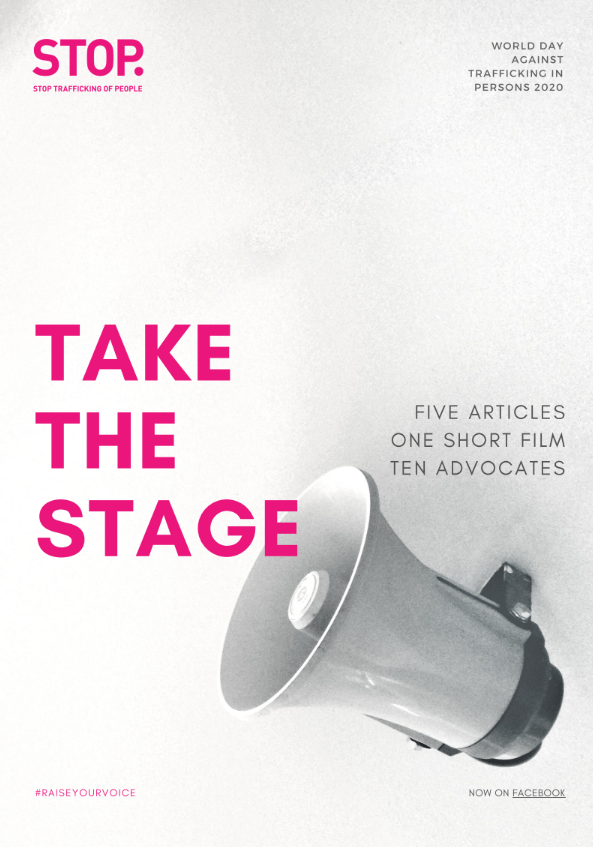
As global citizens, each of us shoulder the duty to ponder, discuss and protect human rights; to give voice to the voiceless; and to care for the wellbeing of the vulnerable. STOP firmly believes that the key to putting a stop to Hong Kong’s “hidden epidemic” of human trafficking, is by listening with humility to the diverse voices in our community, and by encouraging people of all ages and backgrounds to actively engage in discussion about these issues.
In preparation for World Day Against Trafficking in Persons this year, STOP invited a group of our volunteers and Jacqueline (Research and Policy Officer of STOP) to ‘take the stage’ and share with us their thoughts & knowledge about human trafficking through a series of articles and a short film (Cantonese).
Human Trafficking and Modern Slavery are problems embedded in the complex global supply chains that produce the goods we buy and use every day. Many of the products on the List of Goods Produced by Child Labor or Forced Labor are agricultural products, which means that many of them are food. These include corn, sugarcane, coffee, beans, rice, cocoa, fish, tomatoes and so on.

CHILD LABOUR IN THE PRODUCTION OF COCOA
In Africa, an estimated 2 million children work on cocoa farms in Ghana and the Ivory Coast, which produce 60% of the world’s cocoa, the main ingredient in chocolate. According to a Washington Post investigation, boys from Burkina Faso were lured from home with false promises of educational opportunities, taken to work on cocoa farms in the Ivory Coast and controlled by a “gran patron”, which means “big boss”. A farmer who was interviewed said he pays the “gran patron” a little less than $9 per child for a week of work, who would, in turn, pay each of the boys about half of that. That would mean that a boy would receive a salary of less than $4.5 a week, if at all.
According to a lawsuit filed at the US Supreme Court by six former child labourers, who were kidnapped from their native Mali and put to work on cocoa farms in the Ivory Coast, “they were forced to work up to 14 hours a day, given only scraps of food to eat, and were severely beaten or tortured if they tried to escape.” The conditions are hazardous, because boys on the farms, some as young as six, are forced to spray dangerous pesticides and use sharp machetes to clear the forest.
In 2001, eight major chocolate companies, including Hershey, Mars & Nestlé USA, pledged to eradicate child labour by 2005, in an agreement that became known as the Harkin-Engel Protocol. They missed the deadline in 2005, and then again in 2008 and 2010. They then scaled back their promises and set a goal to reduce child labour by 70% by 2020, a deadline they also missed. This failure, according to critics, is due to indecision and insufficient financial commitment. According to the Washington Post investigation, “the industry, which collects an estimated $103 billion in sales annually, has spent more than $150 million over 18 years to address the issue.”
FORCED LABOUR AND CHILD LABOUR IN THE COFFEE INDUSTRY
Modern Slavery is also a problem in the coffee industry. Around the world, approximately 26 million people work on coffee plantations every year and may be in conditions of child labour or forced labour in 18 different countries.
For example, forced labour and child labour have been reported in Brazil, which is the world’s largest exporter of coffee, accounting for about one-third of the global market. A Thomson Reuters Foundation investigation over six months uncovered extensive slave labour running largely unchecked in Minas Gerais, a region that produces more than half the coffee beans in Brazil. In 2019, inspectors discovered workers, including children as young as 13, who were undocumented, underpaid and lacking safety equipment as required by law. “The workers had no rights whatsoever,” said Marcelo Campos, the labour inspector who coordinated the raids.
Women and children are highly vulnerable to exploitation on coffee plantations. Women tend to perform lower skilled tasks, work more hours overall, be paid less and experience high rates of sexual assault. Child labour is also a persistent issue. Family-run, smallholder coffee farms produce 60% of the world’s coffee, and almost half of these families live in poverty. When coffee prices fall in this volatile market, families cannot afford to send their children to school and are forced to put them to work on their farms.
WHAT CAN BE DONE
The crux of the problem is that corporations currently do not suffer any serious consequences for failing to address the issue of modern slavery in their supply chains. They are unlikely to take meaningful action until there is sufficient incentive. Collectively, consumers have the power to incentivize much-needed change. By encouraging companies to take steps to make their supply chains ethical and sustainable and by rewarding the companies that do so with their purchasing power, consumers make a great difference.
AUTHOR (CHINESE): EUGENE CHAN | PHOTOGRAPHY: CAROL LAU
PROJECT CONSULTANT: RIGHTS EXPOSURE | PARTNER ORGANISATION: TEEN’S KEY
“I can have someone keep me company and get paid. So I thought why not?” Crystal (not her real name) looks back on how she used to view compensated dating when she first joined the PTGF (part-time girlfriend) industry at age 15, unsuspecting of the indelible pains that would later ensue. Another girl, Hedy, felt she had little choice but to make money through sex work, in order to pay off her ex-boyfriend’s debts. Each girl entered the industry for different reasons, but both wondered in retrospect – had they been given a fuller picture of their sexual rights in school, perhaps their journeys would have turned out differently.
The trauma of sexual assault A brush with death
Crystal, now 20, was diagnosed a few years ago with borderline personality disorder, triggered by an event she experienced in her first year of working as a PTGF. At the time, she was approached by a customer who offered to pay a year’s worth of money to sugar-date Crystal, claiming he only requests for hand jobs, and that she would not be forced to do anything against her will. However, when they met at the hotel later, she was raped, and received HK$500 only. The payment was far from the agreed price, but fearful for her personal safety, she did not dare to chase the outstanding amount and left.
A few days later, much to her dismay, Crystal received from the customer a secretly filmed video of herself getting dressed, and was blackmailed to meet with him again, or the video would be sent to her school. “I was terrified. Not knowing whom I could turn to, I ran to a flyover near home. I seriously considered jumping down to end it all,” she said. Fortunately, Crystal changed her mind and sought help. Accompanied by the outreach social worker of Teen’s Key, a local nonprofit organization supporting PTGF, she reported to the police. The man involved was eventually convicted and sentenced to imprisonment on the charges of criminal intimidation and rape of a minor. Yet, the suffering inflicted by his crime continued to affect Crystal: she was diagnosed with borderline personality disorder, showed symptoms of post-traumatic stress syndrome, and at one point, engaged in binge-eating to cope with her emotional instability, which caused her to drop out of school.
Now when Crystal recounts the appalling experience, she speaks about it cheerfully, as if it were someone else’s story, “I don’t wish to burden others. I really want to spread joy, and not be immersed in excessive sorrow for an event in the past.” After the ordeal, in the darkest time of her life, social workers of Teen’s Key stood by her side all along. Later, when she fell in love with someone, and revealed to him after considerable hesitation what she used to do for work, he was not bothered by it, and showed unwavering commitment to their relationship. “He appreciates and accepts me. Perhaps God wants me to be back on my feet too. History cannot be changed, but in happiness, I can put behind the past.” With the support of friends and family, slowly but surely, she began to heal. The incident did not rob Krystal of her dreams – with a diploma in Design, she aspires to create luscious lingerie for plus-size women in the future.
Body for rent to clear debt Longing for the end
Different from Crystal who has already left the PTGF industry, 25 year-old Hedy* remains active in the PTGF industry, but no longer sugar-dates on a full-time basis. She has taken on multiple other part-time jobs to diversify her income stream instead. “Growing old is inevitable. Would I be able to continue working this job when I’m older? Truth be told, I am not the type of girl who wants to be financially dependent on men. I know they are unreliable.”
Hedy shared that she only joined the industry just to pay off debt. “My ex-boyfriend and I used to live together. He took out loans under my name. When we separated, I was in debt for more than HK$100,000.” She crowded her schedule with work. During the peak of Krystal’s PTGF career, she used to take on three sex jobs a week, while filling the remaining gaps in her schedule with sugar-dating bookings, like meeting customers for lunch/dinner, go shopping, or to the movies. She had also been treated roughly by customers before. “Pinching and beating… all kinds of physical abuse … [it was] so painful! Those men didn’t come to deal with their sexual desires. They were venting their rage through inflict violence,” yet, Hedy forced herself to endure. She has now paid off most the debt, and is diligently saving, “it’s most pragmatic to be self-dependent after all,” she said.
Heartened new beginnings Promoting sexual rights education
Though she no longer works as a PTGF, Krystal still occasionally goes online to keep tabs on other PTGFs’ activities on social platforms. She was shocked to discover that “girls as young as 12 and 13 year-olds are already engaging in sugar-dating. The youngest PTGF I have ever came across was just 11 years old. Some of them would post very explicit nudes that clearly show their face!”
While Krystal believes that sex work is work, she thinks that it is due to the inadequacy of school-based sex education, that young girls in the industry often lack awareness to protect themselves, and think too lightly of the sex work as a profession, even oblivious to where the risks and dangers lie. “I was like that back then. Why is it not different for younger girls these days?” Seeing stagnant progress in Hong Kong’s sex education, through Teen’s Key, Krystal began giving school talks to share with students her experience as a former PTGF. With hopes to support other survivors using her personal experience, she wishes to pursue further studies in Sex Education and Law next.
Hedy also gained better knowledge about her sexual rights from using Teen’s Key’s services. “My school took a strong stance against students dating, and bring up sex was out of the question. It was only during Biology class in Form 5 that we were briefly taught how to use contraception… Students, of course, dated in secret. Back in the day, I thought loving someone meant satisfying their every request. I didn’t know how to reject my partner, even when I did not feel comfortable. I only understand now that I always have the option to say “no”, and that I should never have to resign myself to situations that don’t sit well with me.” Hedy thinks that if her school had provided her with proper sexual rights education back then, particularly on ways to build healthy romantic relationships, perhaps the trajectory of events would have been different.






